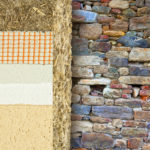Rockwool insulation, also known as mineral wool insulation, is a popular option for insulating buildings. It is made from rock, slag, or other mineral fibers and is used to reduce heat loss and noise pollution. However, some homeowners may have concerns about its breathability. In this article, we will explore whether Rockwool insulation is breathable and discuss its pros and cons. We will also examine whether it can be used to insulate stone or solid walls.
Pros and Cons of Rockwool Insulation
One of the main advantages of Rockwool insulation is its fire resistance. It is made from materials that can withstand high temperatures and will not contribute to the spread of flames in the event of a fire. Additionally, Rockwool insulation is durable and can last for decades without losing its insulating properties.
Another benefit of Rockwool insulation is its sound-absorbing qualities. It can help to reduce noise pollution and make a home more comfortable and peaceful. Rockwool insulation is also resistant to moisture and can help to prevent mold and mildew from forming in a building.
However, there are also some disadvantages to Rockwool insulation. One of the main drawbacks is that it can be irritating to the skin, eyes, and respiratory system. This can make it difficult to install, and it may not be suitable for people with allergies or sensitivities. Additionally, Rockwool insulation is not as environmentally friendly as some other insulation materials, as it requires a significant amount of energy to manufacture.
The breathability of Rockwool Insulation
Rockwool insulation is not considered to be breathable, as it does not allow air to pass through it easily. This can be both an advantage and a disadvantage, depending on the situation. In some cases, a lack of breathability may be desirable, as it can help to prevent drafts and maintain a consistent temperature in a building. However, in other cases, it may be important to have a breathable insulation material that allows for air circulation.
Rockwool can be used for a number of applications including attic/loft insulation. If you are looking for other breathable alternatives you can check out this article here.
Using Rockwool to Insulate Stone or Solid Walls
Rockwool insulation can be used to insulate stone or solid walls, but it may require additional preparation and installation techniques. In some cases, it may be necessary to create a cavity in the wall to accommodate the insulation. Additionally, care must be taken to ensure that the insulation is properly sealed and does not allow moisture to penetrate the wall.
Conclusion
Rockwool insulation is a popular option for homeowners looking to improve the energy efficiency and comfort of their homes. While it is not considered to be breathable, it has many other benefits, including fire resistance, sound absorption, and moisture resistance. However, it is important to be aware of its drawbacks, including its potential to irritate the skin, eyes, and respiratory system. If you are considering using Rockwool insulation to insulate stone or solid walls, it is important to work with a professional who can help you to ensure that the insulation is properly installed and sealed.
If you are looking for other breathable alternatives you can check out this article here.










